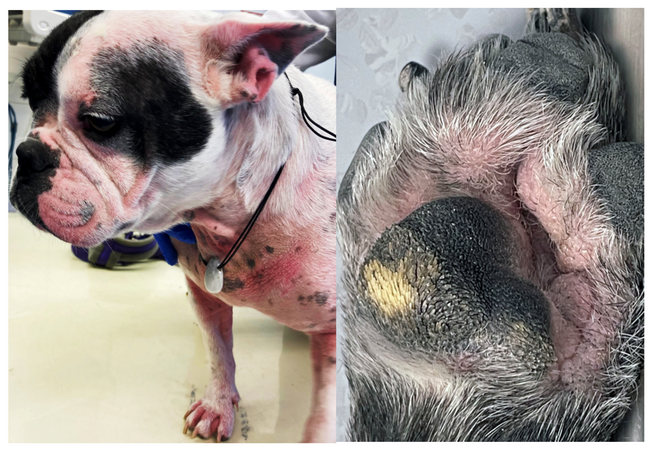Vet’s 2025 Guide to Sterile Nodular & Granulomatous Dermatoses in Dogs 🩺 Nodules, Diagnosis, & Therapy

In this article
Vet’s 2025 Guide to Sterile Nodular & Granulomatous Dermatoses in Dogs 🩺 Nodules, Diagnosis & Therapy
By Dr. Duncan Houston BVSc
💡 What Are These Dermatoses?
These are sterile nodular or granulomatous skin diseases in dogs—immune‑mediated nodules, plaques, or granulomas with no infectious cause. Often include sterile panniculitis, sterile pyogranuloma, or juvenile cellulitis (“puppy strangles”).
🚩 Causes & Risk Factors
- 🎯 Idiopathic immune reactions—inflammation clustering under the skin (subcutis) or dermis.
- 👶 Puppy cellulitis affects pups 3–8 months old—nodules, facial swelling, lymph node enlargement, fever (“puppy strangles”).
- 🐕 Breeds at higher risk: Collie, Boxer, Golden Retriever, Great Dane, Weimaraner, Dachshund and others.
- 🧪 Excludes infectious, foreign body, neoplastic, or trauma triggers—diagnosis of exclusion.
👀 Clinical Signs & Presentation
- 🔵 Firm or soft nodules, plaques, or ulcers in skin—commonly on face, ears, trunk, limbs.
- 👄 Lesional locations: mucocutaneous junctions (lips, eyelids), paws, and body.
- 🔥 May cause mild fever, lethargy, appetite loss during early phases (especially in juvenile cellulitis).
- 🩹 Rarely painful unless ulcerated or infected.
🧪 Diagnostic Workflow
- History & exam: note age, breed, lesion onset, systemic signs.
- Cytology: fine‑needle aspirate—identifies granulomatous vs neutrophilic cells.
- Skin biopsy/histopathology: required to confirm granulomas without infection.
- Immunofluorescence/serology: help exclude autoimmune blistering diseases.
- Culture & stains: bacterial, fungal, mycobacterial tests—all negative in sterile cases.
- Bloodwork: CBC, chemistry—evaluate systemic involvement (e.g. panniculitis).
🛠 Treatment Options
1. Immunosuppressive Therapy 🚑
- 💊 Prednisone/prednisolone: first-line therapy; high‑dose induction then taper as lesions improve.
- ⚖️ Steroid-sparing agents: azathioprine, cyclosporine, mycophenolate—reduce steroid load.
- 🟦 Doxycycline + niacinamide or dapsone helpful (especially with hepatotoxicity risk).
2. Secondary Infection Management 🧼
- 🔬 Use antibiotics if superinfection occurs—choose based on culture results.
- 🛁 Provide medicated baths (chlorhexidine, benzoyl peroxide).
3. Surgical & Supportive Care 🧵
- ✂️ Excise single isolated nodules when feasible.
- 🩹 Clean ulcers, apply steroid or antibiotic ointments.
- 💧 Provide pain relief and nourishment, especially in pups with puppy strangles.
📈 Monitoring & Prognosis
- 📆 Re‑evaluate every 2–4 weeks during initial therapy, then every 2–3 months during maintenance.
- 🔁 Relapse is common—lifelong or long‑term immunosuppression may be necessary.
- ✅ Prognosis is good to excellent for most dogs; severe cases (panniculitis, systemic involvement) may require intensive therapy.
🏡 Ask A Vet App Home‑Support Tools 📲
- 🗓 Treatment reminders and tapering schedules.
- 📊 Log nodules, appetite, energy levels, lesion photos.
- 📸 Upload images for remote veterinary review.
- 🔔 Alerts for worsening lesions, new nodules, infection signs.
- 📚 Care guides: lesion biopsy, antibiotic baths, wound cleaning.
🔑 Key Takeaways ✅
- 🌟 Sterile nodular/granulomatous dermatoses are immune-related skin conditions with no infection.
- 🔍 Diagnosis requires biopsy, cytology, and culture to exclude other causes.
- 💡 Treatment focuses on immunosuppression (steroids ± adjuvants), with supportive care.
- 🕒 Regular monitoring essential—relapses are common, but most dogs respond well.
- 📱 Ask A Vet app supports owners with structured care, monitoring, and expert guidance.
🩺 Final Thoughts ❤️
In 2025, improved diagnostic precision and treatment options make sterile nodular and granulomatous dermatoses highly manageable. Though relapses can occur, tailored immunosuppressive protocols paired with proper home care and expert veterinary guidance—supported by tools like Ask A Vet—help dogs recover comfortably and maintain their quality of life. Vigilance and partnership with your veterinary team are key 🐾✨.
Visit AskAVet.com and download the Ask A Vet app to track meds, log lesions, upload photos, set alerts, and stay connected with veterinary professionals anytime. 📲🐶






